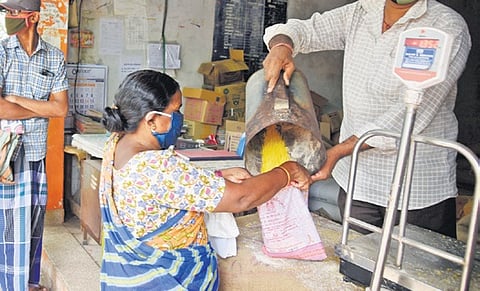

CHENNAI: The pilot scheme launched by Tamil Nadu to distribute 2 kg of ragi (finger millet) instead of rice to eligible and interested ration cardholders through Public Distribution System (PDS) in Dharmapuri and the Nilgiris districts in May 2023 to promote millet consumption is yet to gain momentum, primarily due to challenges in procuring ragi from farmers.
This is despite Tamil Nadu being the second largest producer of ragi, only next to Karnataka. The state’s annual production ranges between 2.27 lakh and 2.55 lakh metric tonnes (MTs), with Krishnagiri, Dharmapuri, Erode, Tiruvannamalai, and Salem being the top ragi-producing districts. Moreover, the minimum support price (MSP) of Rs 42.9 per kg offered by the government at its Direct Procurement Centres (DPCs) is higher than what the farmers usually get in the open market.
A section of ragi farmers TNIE spoke to acknowledged that private buyers offer between Rs 3,900 and Rs 4,000 per 100 kg, which is less than the Rs 4,290 they can get in DPCs.
Officials and farmers say merchants’ immediate cash payment in the open market and farmers’ culture of taking loans in advance from these merchants to manage their cultivation costs are the key factors that push them to sell in open markets.
690 tonnes of ragi bought by TNCSC in six months
While 1,360 MTs of ragi is needed every month for this pilot scheme, which is implemented with support from the union government, data obtained from Tamil Nadu Civil Supplies Corporation (TNCSC) by TNIE showed that it has procured only a total of 690 MTs of ragi in the six-month period from September 1, 2024, when this year’s kharif marketing season officially started, till February 28, 2025.
S Narayanan, a farmer and an ex-serviceman from Palacode in Dharmapuri district, told TNIE that private buyers provide immediate payment even for third-quality ragi, with only minor deductions. “Many ragi farmers in Dharmapuri district borrow money from loan sharks, who are often linked to wholesale dealers of ragi. Therefore, they sell their produce for even Rs 33-35 per kg. Only debt-free farmers can afford to choose DPCs,” he explained.
He also pointed out that while DPCs demand certain basic processing to be done by the farmers before procurement, private buyers do not insist on this. Additionally, farmers alleged that the operation of DPCs in Dharmapuri, where maximum procurement should happen, does not align with the ragi cultivation period, discouraging them from selling.
TNCSC officials said the majority of the teething problems have been resolved. The corporation has assigned officials at the level of DROs to oversee ragi procurement and to encourage farmers to sell their produce to DPCs, they added.
A senior official said the ragi farmers are not familiar with the concept of DPCs, unlike paddy farmers. He said awareness is being raised that the farmers need to submit their land and bank account details to receive payments. “Along with the agriculture department, we have held meetings to raise awareness about farmers supplying produce to DPCs. This year, following the harvest in June and July, we expect a significant increase in ragi procurement,” the official said. Once the supply improves, the state has plans to expand ragi distribution to other districts as well, the official added.